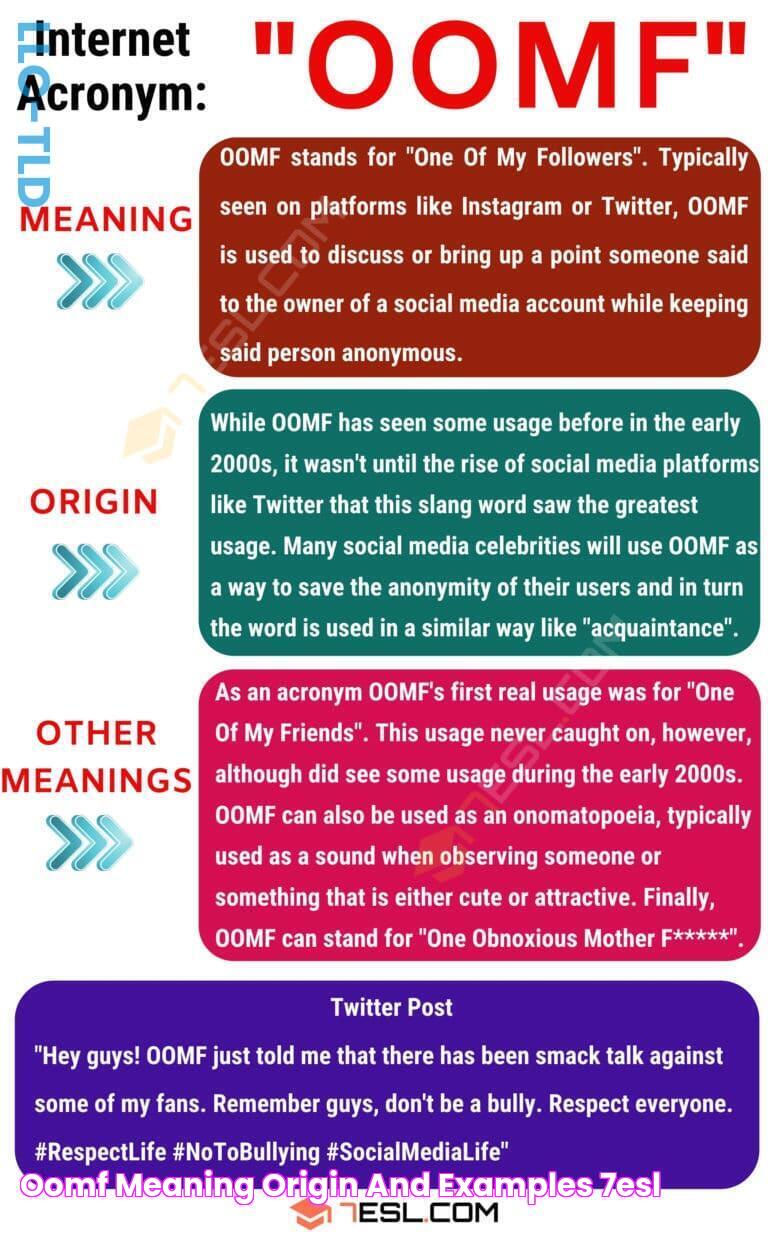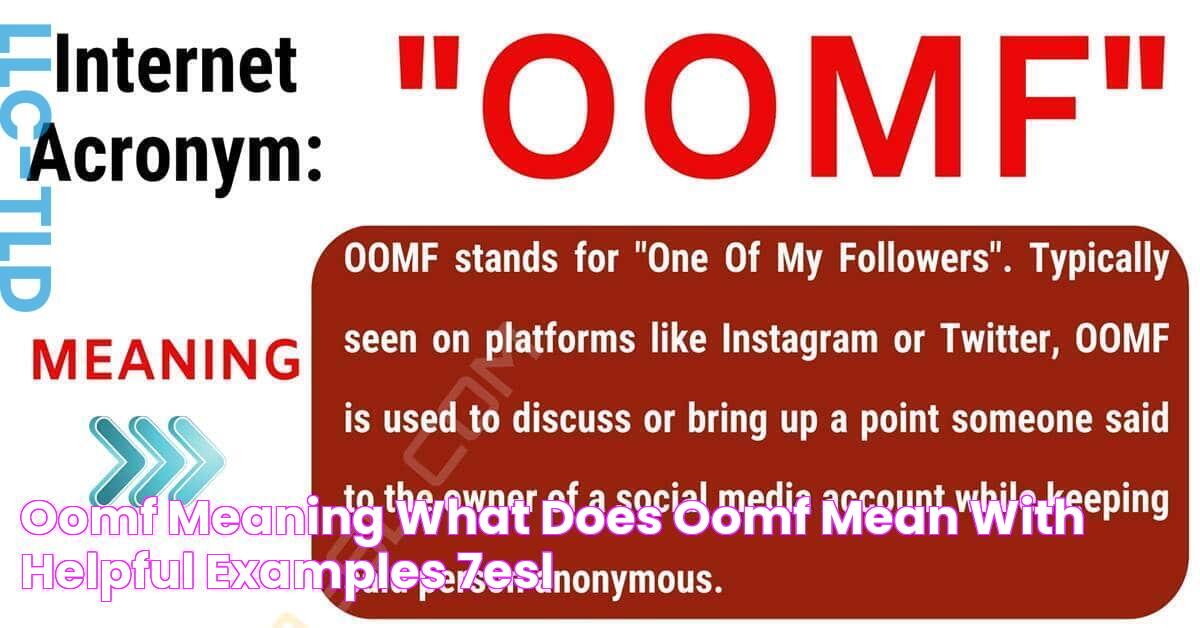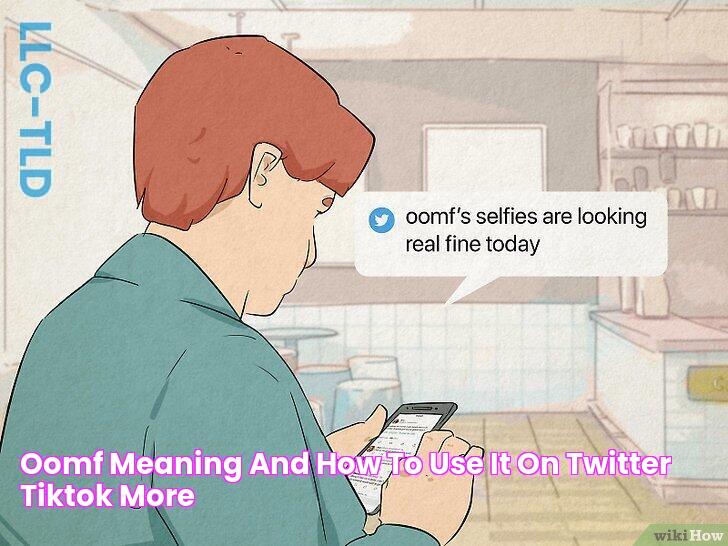Oomf Meaning | Definition Of Oomf For Google Discover
In the realm of online communication, "oomf" has emerged as a ubiquitous acronym carrying significant weight. Often employed in social media and messaging platforms, "oomf" stands for "One of my followers." It serves as a discreet way to refer to a specific individual without explicitly disclosing their identity.
The importance of "oomf" lies in its ability to maintain privacy while engaging in online discussions or interactions. By using "oomf," individuals can avoid potential awkwardness or confrontations that may arise from directly naming someone. Furthermore, it allows for a sense of anonymity, providing a safe space for expressing opinions or engaging in sensitive conversations.
The usage of "oomf" has become increasingly prevalent in recent times, reflecting the growing emphasis on online privacy and the desire for anonymity in digital spaces. As social media platforms continue to evolve, it is likely that "oomf" will remain a staple in the online lexicon, serving as a valuable tool for maintaining discretion and fostering meaningful interactions.
Read also:Before The Transformation Heidi Montags Journey Presurgery
oomf meaning
The term "oomf" has gained widespread usage in online communication, particularly on social media platforms. Understanding its various dimensions is crucial for effective online interactions.
- Acronym: One of my followers
- Privacy: Maintains anonymity and discretion
- Social media: Prevalent on platforms like Twitter and Instagram
- Communication: Facilitates discussions without direct naming
- Engagement: Encourages participation and interaction
- Online culture: Reflects the growing emphasis on privacy in digital spaces
These key aspects highlight the significance of "oomf" in online communication. It enables individuals to engage in meaningful interactions while maintaining their privacy. As social media continues to shape our online experiences, understanding the nuances of "oomf" and its implications becomes increasingly important.
1. Acronym
The acronym "oomf" stands for "One of my followers." It is commonly used on social media platforms, particularly Twitter and Instagram, to refer to a follower without explicitly naming them.
- Privacy and Discretion: "Oomf" allows users to maintain privacy and discretion in their online interactions. By using "oomf," individuals can avoid potential awkwardness or confrontations that may arise from directly naming someone, especially when discussing sensitive topics or expressing opinions.
- Anonymity: "Oomf" provides a sense of anonymity, creating a safe space for users to engage in discussions without revealing their identities. This can be particularly beneficial for individuals who wish to share personal experiences or seek advice without fear of judgment or repercussions.
- Engagement: "Oomf" can encourage engagement and participation in online discussions. By referring to followers anonymously, users can foster a sense of community and inclusivity, inviting others to share their perspectives and opinions without feeling pressured to self-identify.
- Online Culture: The widespread use of "oomf" reflects the growing emphasis on privacy and anonymity in online culture. As social media platforms continue to evolve, individuals are increasingly seeking ways to maintain their privacy while still engaging in meaningful online interactions.
In conclusion, the acronym "oomf" plays a significant role in online communication, particularly on social media. It enables users to maintain privacy, anonymity, and discretion while fostering engagement and participation in online discussions. Understanding the connection between "Acronym: One of my followers" and "oomf meaning" provides valuable insights into the nuances of online communication and the evolving nature of digital interactions.
2. Privacy
The connection between "Privacy: Maintains anonymity and discretion" and "oomf meaning" is inextricably linked to the evolving nature of online communication. In the digital age, individuals seek greater control over their privacy and the disclosure of their personal information.
The acronym "oomf" has emerged as a valuable tool for maintaining privacy and discretion in online interactions. By using "oomf" to refer to followers without explicitly naming them, users can engage in discussions and share their perspectives without revealing their identities. This anonymity provides a sense of security and comfort, allowing individuals to participate in online communities without fear of judgment or repercussions.
Read also:Discover The Ultimate Guide To Understanding And Applying Pafoa
The importance of privacy and discretion in online communication cannot be overstated. It empowers individuals to express themselves freely, seek support, and engage in sensitive discussions without compromising their personal information. The use of "oomf" exemplifies this growing need for privacy and discretion in the digital realm.
In conclusion, the connection between "Privacy: Maintains anonymity and discretion" and "oomf meaning" underscores the significance of privacy in online interactions. "Oomf" serves as a powerful tool that enables individuals to engage in meaningful discussions while safeguarding their personal information and maintaining their anonymity.
3. Social media
The widespread usage of "oomf" on social media platforms like Twitter and Instagram underscores its significance in contemporary online communication. This prevalence can be attributed to several key factors:
- Anonymity and Privacy: Social media platforms provide a sense of anonymity and privacy, making them ideal for using "oomf" to refer to followers without explicitly revealing their identities. This anonymity allows users to engage in discussions and share their opinions without fear of judgment or repercussions.
- Community Building: "Oomf" fosters a sense of community and inclusivity on social media. By referring to followers anonymously, users can create a welcoming environment where individuals feel comfortable sharing their perspectives and participating in discussions.
- Engagement and Participation: The use of "oomf" encourages engagement and participation on social media. By addressing followers anonymously, users can invite others to join conversations, share their thoughts, and engage with the content being shared.
- Cultural Relevance: "Oomf" has become an integral part of social media culture, particularly among younger generations. Its widespread usage reflects the evolving norms and conventions of online communication.
In conclusion, the prevalence of "oomf" on social media platforms like Twitter and Instagram is deeply intertwined with its ability to maintain anonymity, foster community, encourage engagement, and align with cultural norms. Understanding this connection provides valuable insights into the dynamics of online communication and the role of "oomf" in shaping these interactions.
4. Communication
The connection between "Communication: Facilitates discussions without direct naming" and "oomf meaning" lies at the heart of effective online communication. "Oomf" enables individuals to engage in meaningful discussions and share their perspectives without explicitly revealing their identities.
- Privacy and Discretion: "Oomf" allows users to maintain privacy and discretion in their online interactions. By using "oomf" to refer to followers without explicitly naming them, individuals can engage in sensitive discussions or express opinions without fear of judgment or repercussions.
- Constructive Dialogue: "Oomf" fosters constructive dialogue by creating a safe and inclusive space for individuals to share their thoughts and ideas. Anonymity reduces the likelihood of personal attacks or biases, allowing for more objective and nuanced discussions.
- Community Building: "Oomf" contributes to community building by encouraging participation and engagement. By addressing followers anonymously, users can invite others to join conversations and share their perspectives, fostering a sense of belonging and inclusivity.
- Cultural Norms: The use of "oomf" aligns with evolving cultural norms around online communication. In an increasingly privacy-conscious digital landscape, "oomf" provides a way for individuals to engage in discussions while maintaining a degree of anonymity.
In conclusion, the connection between "Communication: Facilitates discussions without direct naming" and "oomf meaning" highlights the importance of privacy, constructive dialogue, community building, and cultural norms in online communication. "Oomf" serves as a valuable tool that enables individuals to engage in meaningful discussions while safeguarding their personal information and fostering a sense of community.
5. Engagement
The connection between "Engagement: Encourages participation and interaction" and "oomf meaning" lies in the power of anonymity to foster a sense of inclusivity and encourage active participation in online discussions.
Anonymity reduces the fear of judgment or repercussion, allowing individuals to engage more freely and openly. By using "oomf" to refer to followers without directly naming them, users can create a welcoming environment where everyone feels comfortable sharing their thoughts and ideas.
Increased participation leads to more diverse perspectives, richer discussions, and a stronger sense of community. This engagement is crucial for the growth and vitality of online spaces, as it allows for the exchange of knowledge, the formation of new connections, and the exploration of different viewpoints.
In conclusion, the connection between "Engagement: Encourages participation and interaction" and "oomf meaning" highlights the importance of anonymity in fostering a sense of inclusivity and encouraging active participation in online discussions. This understanding is essential for creating vibrant and engaging online communities where diverse perspectives can be shared and new connections can be formed.
6. Online culture
The connection between "Online culture: Reflects the growing emphasis on privacy in digital spaces" and "oomf meaning" underscores the evolving nature of online communication and the increasing importance of privacy in the digital realm.
- Anonymity and Discretion:
In the digital age, individuals seek greater control over their personal information and online presence. "Oomf" provides a means of engaging in online discussions and interactions without revealing one's identity, allowing for anonymity and discretion.
- Protection from Harassment:
Anonymity through "oomf" can protect users from potential harassment or cyberbullying. By not directly identifying themselves, individuals can participate in discussions without fear of targeted attacks or negative consequences.
- Sensitive Topic Discussions:
"Oomf" facilitates discussions on sensitive or controversial topics where individuals may prefer to maintain anonymity to express their opinions or experiences without fear of judgment or repercussions.
- Cultural Shift:
The widespread use of "oomf" reflects a cultural shift towards valuing privacy and anonymity in online spaces. It aligns with the growing awareness of the potential risks associated with sharing personal information online.
In conclusion, the connection between "Online culture: Reflects the growing emphasis on privacy in digital spaces" and "oomf meaning" highlights the crucial role of privacy in shaping online communication. "Oomf" serves as a tool that empowers individuals to engage in meaningful discussions while maintaining their anonymity and protecting their personal information.
FAQs on "oomf meaning"
This section provides answers to frequently asked questions about the meaning and usage of "oomf" in online communication.
Question 1: What does "oomf" stand for?
Answer: "Oomf" stands for "One of my followers." It is commonly used on social media platforms like Twitter and Instagram to refer to a follower without explicitly naming them.
Question 2: Why is "oomf" used?
Answer: "Oomf" is used to maintain privacy and discretion in online interactions. By using "oomf," users can avoid potential awkwardness or confrontations that may arise from directly naming someone, especially when discussing sensitive topics or expressing opinions.
Question 3: Is it appropriate to use "oomf" in all situations?
Answer: While "oomf" is generally acceptable in casual online conversations, it may not be appropriate in formal or professional settings. It is important to consider the context and audience before using "oomf" to ensure that it is used respectfully and appropriately.
Question 4: Can "oomf" be used to refer to multiple followers?
Answer: Yes, "oomf" can be used to refer to multiple followers. For example, someone might say "Shoutout to all my oomfs who supported me!" to express gratitude to their followers.
Question 5: Is "oomf" only used on social media?
Answer: While "oomf" is primarily used on social media platforms, it may also be used in other online contexts, such as forums or chat rooms, where users wish to maintain anonymity or discretion.
Question 6: What are some alternatives to using "oomf"?
Answer: Some alternatives to using "oomf" include using the person's username, referring to them by their interests or hobbies, or simply using the term "follower." The choice of alternative depends on the context and the level of anonymity desired.
These FAQs provide a comprehensive overview of the meaning and usage of "oomf" in online communication. Understanding these nuances is crucial for effective and respectful interactions in digital spaces.
Transition to the next article section:
To further explore the significance and implications of "oomf" in online communication, let's delve into its impact on privacy, community building, and the evolving norms of digital interactions.
Tips for Using "oomf meaning" Effectively
Incorporating "oomf" into online communication requires careful consideration and adherence to certain best practices. Here are some tips to guide effective and respectful usage:
Tip 1: Prioritize Privacy and Discretion
Remember that the primary purpose of "oomf" is to maintain privacy and discretion. Avoid using it in situations where directly naming someone would be more appropriate or respectful.
Tip 2: Use "oomf" Sparingly
While "oomf" can be a useful tool, overuse can diminish its effectiveness. Use it judiciously to maintain its intended purpose and avoid confusion.
Tip 3: Consider Context and Audience
The appropriateness of using "oomf" depends on the context and audience. Formal or professional settings may not be suitable for "oomf," while casual online conversations may be more accepting.
Tip 4: Respect Boundaries
If someone expresses discomfort with being referred to as "oomf," respect their wishes. Remember that the goal is to foster a positive and inclusive online environment.
Tip 5: Be Mindful of Tone
"Oomf" should be used in a respectful and considerate manner. Avoid using it sarcastically or dismissively, as this can undermine its intended purpose.
By following these tips, you can effectively incorporate "oomf" into your online communication, maintaining privacy while fostering respectful and meaningful interactions.
Transition to the article's conclusion:
Understanding the nuances of "oomf meaning" and employing it effectively are essential for navigating the ever-evolving landscape of online communication. By prioritizing privacy, using "oomf" judiciously, considering context and audience, respecting boundaries, and being mindful of tone, you can contribute to a positive and inclusive digital environment.
Conclusion
Our exploration of "oomf meaning" has unveiled its multifaceted nature and significance in online communication. "Oomf" serves as a valuable tool for maintaining privacy and discretion, fostering inclusivity, and encouraging participation in digital spaces.
Understanding and adhering to the nuances of "oomf" usage is essential for navigating the evolving landscape of online interactions. By prioritizing privacy, using "oomf" judiciously, considering context and audience, respecting boundaries, and being mindful of tone, we can contribute to positive and meaningful digital environments.
As technology continues to shape our communication, the responsible use of "oomf" and other similar constructs will be crucial for preserving privacy and fostering healthy online communities. Let us embrace the power of anonymity while upholding the values of respect, inclusivity, and transparency in our digital interactions.
Sydney McLaughlin-Levrone's Legendary Achievements: A Glimpse Into Her Glory
Discover The Best Bangers At Bangers Restaurant In Austin
Explore The County That Memphis Calls Home: Uncover The History And Location


